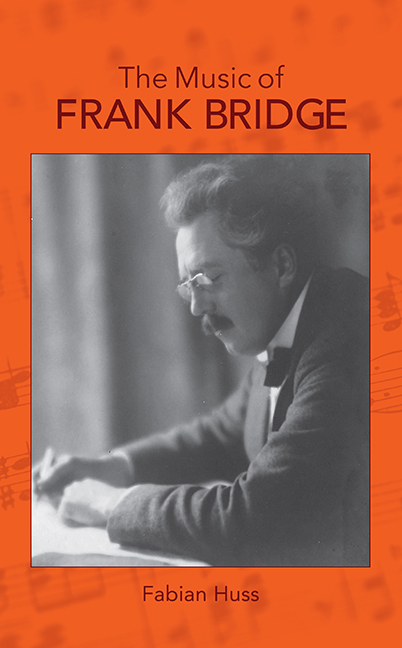Book contents
- Frontmatter
- Contents
- List of Musical Examples
- Acknowledgments
- Introduction
- Chapter 1 Background, Royal College of Music and Early Works
- Chapter 2 First Maturity
- Chapter 3 Transitional Period
- Chapter 4 Bridge’s Post-Tonal Idiom: Piano Sonata and Third String Quartet
- Interlude Elizabeth Sprague Coolidge
- Chapter 5 Progressive Works, 1927–1932
- Interlude Benjamin Britten
- Chapter 6 Last Years
- List of Works
- Bibliography
- Index
Chapter 1 - Background, Royal College of Music and Early Works
Published online by Cambridge University Press: 02 June 2021
- Frontmatter
- Contents
- List of Musical Examples
- Acknowledgments
- Introduction
- Chapter 1 Background, Royal College of Music and Early Works
- Chapter 2 First Maturity
- Chapter 3 Transitional Period
- Chapter 4 Bridge’s Post-Tonal Idiom: Piano Sonata and Third String Quartet
- Interlude Elizabeth Sprague Coolidge
- Chapter 5 Progressive Works, 1927–1932
- Interlude Benjamin Britten
- Chapter 6 Last Years
- List of Works
- Bibliography
- Index
Summary
FRANK Bridge was born on 26 February 1879 in Brighton, the tenth of twelve children of William Henry Bridge, with his second wife Elizabeth (née Warbrick). William Henry came from a family of craftsmen, starting out as a lithographer before becoming a violin teacher and director of a music-hall orchestra (the Old Oxford Theatre, later Empire Theatre). Bridge received his first violin lessons from his father before attending Brighton Music School and playing in his father's orchestra, which he conducted in his father's absence and for which he arranged music. He also played chamber music with members of his family, laying the foundations for a life-long fascination with this private genre; his lasting devotion to chamber music of ambitious scope and lofty aesthetic ideals suggests that these early experiences may have provided a welcome contrast to the more mundane professional commitments of the family trade.
A distinctly Victorian mind-set is evident in William Bridge's disciplinarian approach to music tuition, making his son practise long hours, which caused him to develop back problems. As Mark Amos has pointed out, there were good reasons for his father's strictness: the working conditions for orchestral players were tough, and rising above this milieu required dedication and discipline. Learning and making music were thus presented to Bridge as immensely serious matters, and although he could later compose and perform music reflecting his wit and jovial sense of humour, in some ways he never rebelled against his father's somewhat austere concept of music-making. The professionalism and perfectionism he pursued in all his musical activities were direct outgrowths of this upbringing, and his meticulous attitude to composition was to influence his style in various ways over the course of his career. Indeed, one might identify an underlying insecurity in Bridge's efforts to cultivate an elevated professional image, not least in his pursuit of technical perfection and an advanced compositional style, suggesting an urge to rise above his modest background. His preoccupation with professional standards also makes itself felt in his quarrel with his brother William (whom he criticised for not taking his cello studies seriously enough, causing a lasting rift), reports of his somewhat prickly demeanour as a conductor, and his acerbic correspondence with Ireland and Vaughan Williams over Britten's education at the Royal College of Music (henceforth RCM).
- Type
- Chapter
- Information
- The Music of Frank Bridge , pp. 9 - 43Publisher: Boydell & BrewerPrint publication year: 2015



